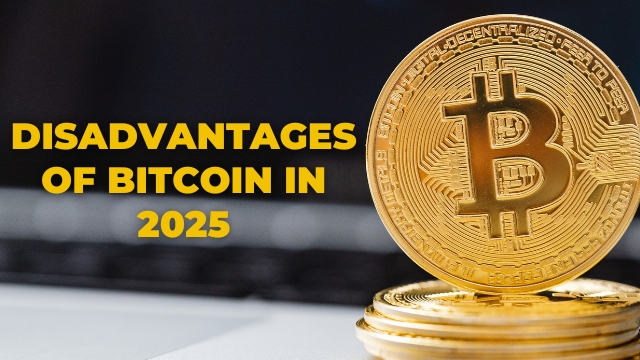Bitcoin has been a revolutionary force in the world of finance, evolving from a niche digital asset to a mainstream investment. With over a decade of history, Bitcoin remains a hot topic among investors, traders, and financial analysts. But as we step into 2025, is Bitcoin still a wise investment?
This article explores the advantages and disadvantages of Bitcoin in 2025, weighing its potential rewards and risks.
Bitcoin in 2025: Where Does It Stand?

Bitcoin’s journey has been marked by significant price fluctuations, regulatory shifts, and growing institutional interest. In 2025, Bitcoin continues to be a dominant cryptocurrency, with a market capitalization exceeding trillions. However, the rise of Central Bank Digital Currencies (CBDCs), government regulations, and competition from newer blockchain innovations challenge its dominance.
Advantages of Bitcoin in 2025

1. Decentralization and Financial Freedom
One of Bitcoin’s core strengths is its decentralized nature. Unlike traditional banking systems, Bitcoin is not controlled by any government or financial institution, providing users with full financial sovereignty. This remains a crucial advantage in 2025 as global financial policies become increasingly restrictive.
2. Hedge Against Inflation
Bitcoin has often been referred to as “digital gold.” With fiat currencies experiencing inflation due to excessive money printing, Bitcoin serves as a hedge, maintaining its value in turbulent economic times. This property has made it a preferred asset for institutional investors.
3. Increased Institutional Adoption
2025 has seen more corporations and hedge funds adding Bitcoin to their balance sheets. Major financial firms offer Bitcoin-based investment products, increasing its legitimacy. The approval of Bitcoin ETFs in multiple countries has also enhanced its accessibility.
Disclaimer:
This blog post is for informational purposes only and does not constitute financial, legal, or investment advice. We do not guarantee accuracy, reliability, or security. Any actions taken based on this content are at your own risk. Always conduct your own research and consult a professional before making decisions.
4. Enhanced Security and Transparency
Bitcoin operates on blockchain technology, ensuring secure, transparent, and immutable transactions. In an era of rising cybersecurity threats, Bitcoin’s security features make it an attractive investment compared to traditional financial assets.
5. Improved Scalability and Efficiency
The adoption of second-layer solutions such as the Lightning Network has significantly improved Bitcoin’s scalability and transaction speed. Lower transaction fees and faster settlements make Bitcoin more practical for everyday transactions.
6. Mainstream Integration and Merchant Acceptance
More businesses, including large retailers and online platforms, accept Bitcoin payments in 2025. This increased usability strengthens its position as a medium of exchange.
7. Fixed Supply and Digital Scarcity
Bitcoin’s maximum supply is capped at 21 million coins, making it a scarce asset. With the upcoming Bitcoin halving in 2024 reducing mining rewards, the reduced supply continues to drive demand and potentially higher prices.
Disadvantages of Bitcoin in 2025

1. Regulatory Uncertainty and Legal Risks
Governments worldwide have imposed stricter regulations on Bitcoin. Some countries have implemented high taxation, while others have banned cryptocurrency transactions altogether. Such regulatory pressures create uncertainty for investors.
2. High Volatility and Price Swings
Despite its mainstream adoption, Bitcoin remains a highly volatile asset. Price swings of 20-30% within days can be unsettling for risk-averse investors. This volatility makes it unsuitable as a stable store of value for some users.
3. Environmental Concerns
Bitcoin mining remains energy-intensive, raising concerns about its environmental impact. While renewable energy solutions are being integrated, Bitcoin’s carbon footprint is still a major point of criticism.
4. Competition from Other Cryptocurrencies
Ethereum, Solana, and other next-generation blockchains offer faster and more efficient solutions. The rise of alternative digital assets threatens Bitcoin’s market dominance, particularly in smart contract and DeFi applications.
5. Limited Use as a Medium of Exchange
Despite its growing adoption, Bitcoin transactions are still slower and costlier compared to traditional payment systems. While the Lightning Network has improved scalability, mass adoption remains a challenge.
6. Potential for Market Manipulation
Whales (large Bitcoin holders) can influence market prices, leading to price manipulation. This centralized control in the hands of a few remains a concern for small investors.
7. Security Threats and Scams
While Bitcoin’s blockchain is secure, investors are still vulnerable to hacks, scams, and lost private keys. Cases of exchange hacks and phishing attacks continue to be reported in 2025, emphasizing the need for proper security practices.
Is Bitcoin Still a Smart Investment in 2025?

Bitcoin remains a compelling investment in 2025, but it is not without risks. Investors should weigh its advantages against its potential downsides. While it continues to be a long-term store of value, short-term volatility and regulatory risks cannot be ignored.
Those with a high-risk tolerance may find Bitcoin an excellent portfolio diversifier, especially as global financial uncertainty persists. However, newcomers should approach with caution, conducting thorough research and understanding market cycles.
Conclusion
Bitcoin remains a powerful financial innovation with both strong advantages and notable risks in 2025. Whether it’s a smart investment depends on an individual’s risk appetite, financial goals, and market outlook. While Bitcoin continues to shape the future of digital finance, investors should stay informed and adapt to the evolving crypto landscape.
Frequently Asked Questions About the Advantages and Disadvantages of Bitcoin in 2025
Q1. Is Bitcoin legal in 2025?
Answer: Bitcoin is legal in most countries but subject to varying degrees of regulation. Some nations have imposed stricter laws, while others fully embrace it.
Q2. Will Bitcoin replace fiat currencies?
Answer: While Bitcoin adoption is increasing, it is unlikely to replace fiat currencies entirely. However, it could function as a global reserve asset alongside traditional money.
Q3. What impact does Bitcoin halving have on its price?
Answer: Historically, Bitcoin halving has led to price increases due to reduced supply. The 2024 halving may drive further price appreciation in 2025.
Q4. Is Bitcoin safe from hacking?
Answer: Bitcoin’s blockchain is highly secure, but investors should be cautious of exchange hacks, scams, and phishing attacks.
Q5. How can I invest in Bitcoin in 2025?
Answer: Investors can buy Bitcoin through crypto exchanges, Bitcoin ETFs, and institutional investment platforms. It’s crucial to use secure wallets for storage.
Disclaimer:
This blog post is for informational purposes only and does not constitute financial, legal, or investment advice. We do not guarantee accuracy, reliability, or security. Any actions taken based on this content are at your own risk. Always conduct your own research and consult a professional before making decisions.

